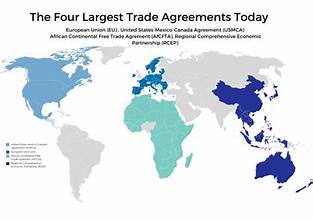
Introduction
In 2024, the landscape of global trade and diplomacy is being significantly reshaped by a series of recent international agreements. These agreements, spanning various sectors and regions, are influencing economic policies, trade relationships, and diplomatic strategies worldwide. This article explores the key agreements of 2024 and their profound impact on global trade and diplomacy, providing insights into how they are shaping the future.
The Rise of Multilateral Trade Agreements
Recent years have seen a shift towards multilateral trade agreements that aim to streamline global trade and address complex economic challenges. The Comprehensive Economic Partnership Agreement (CEPA), signed by multiple countries, exemplifies this trend. By reducing trade barriers and harmonizing regulations, the CEPA is set to boost economic cooperation and facilitate smoother cross-border trade.
Key Benefits of Multilateral Agreements:
- Enhanced Market Access: By opening up new markets, these agreements provide businesses with expanded opportunities for growth.
- Regulatory Harmonization: Streamlined regulations reduce compliance costs and simplify international trade procedures.
- Economic Growth: Increased trade and investment can stimulate economic growth and job creation in participating countries.
The Role of Regional Trade Pacts
In addition to multilateral agreements, regional trade pacts are gaining prominence. The Regional Comprehensive Economic Partnership (RCEP), which includes major economies in Asia and the Pacific, is a prime example. This agreement focuses on deepening economic integration among member countries and fostering regional stability.
Impact of Regional Trade Pacts:
- Strengthened Regional Ties: Regional pacts promote cooperation and understanding among neighboring countries.
- Diversified Supply Chains: Businesses can benefit from diversified supply chains, reducing dependency on single markets.
- Increased Investment Flows: By enhancing economic predictability, regional pacts attract more foreign direct investment.
Diplomatic Shifts and Geopolitical Implications
The recent international agreements also reflect significant diplomatic shifts and geopolitical realignments. For instance, the Paris Agreement on Climate Change has seen renewed commitment from major economies, highlighting the growing importance of environmental sustainability in international diplomacy.
Geopolitical Effects of Recent Agreements:
- New Alliances: Agreements often lead to the formation of new strategic alliances and partnerships.
- Shift in Power Dynamics: Emerging economies are gaining influence, altering traditional power structures.
- Diplomatic Engagement: Increased diplomatic engagement on global issues fosters cooperation and reduces conflicts.
Innovations and Technological Advancements
Technological advancements are a key focus of recent international agreements. The Digital Trade Agreement is one such initiative, aiming to address the challenges posed by digitalization and e-commerce. This agreement seeks to create a framework for digital trade, protecting intellectual property and ensuring data privacy.
Technological Implications:
- Facilitated E-Commerce: Simplified regulations and standards boost cross-border e-commerce.
- Enhanced Data Protection: Agreements often include provisions for stronger data protection and privacy measures.
- Innovation Promotion: By fostering a conducive environment for digital innovation, these agreements support technological growth.
Challenges and Controversies
Despite the positive impacts, recent international agreements are not without challenges and controversies. Issues such as trade imbalances, disputes over intellectual property, and socio-economic inequalities can arise, affecting the overall efficacy of these agreements.
Addressing Challenges:
- Conflict Resolution Mechanisms: Effective mechanisms are essential for resolving disputes and maintaining agreement integrity.
- Inclusive Policies: Ensuring that agreements are inclusive and equitable can help address socio-economic disparities.
- Continuous Negotiation: Ongoing dialogue and negotiation are crucial for adapting agreements to evolving global dynamics.
Conclusion
The international agreements of 2024 are playing a pivotal role in shaping the future of global trade and diplomacy. By fostering economic cooperation, enhancing regional ties, and addressing technological challenges, these agreements are setting the stage for a more interconnected and collaborative world. As global trade and diplomatic relations continue to evolve, the impact of these agreements will likely be felt for years to come.

